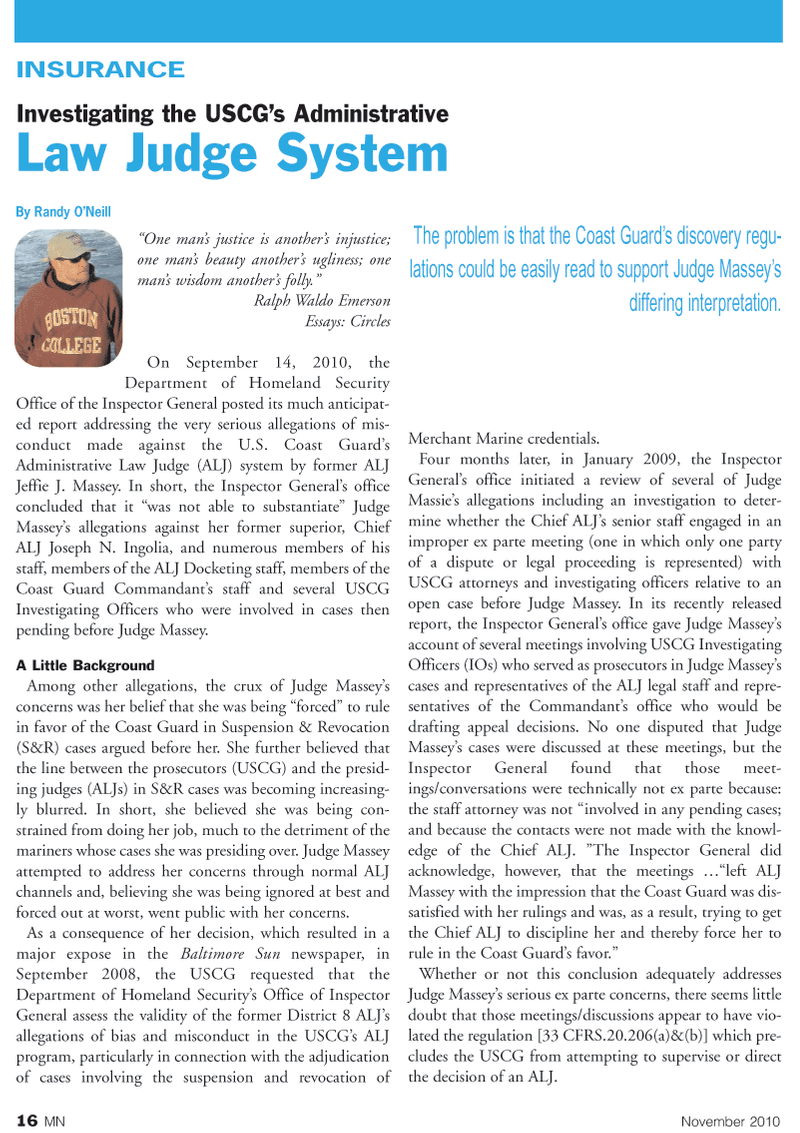
Page 16: of Marine News Magazine (November 2010)
Workboat Annual
Read this page in Pdf, Flash or Html5 edition of November 2010 Marine News Magazine
16 MN November 2010
INSURANCE “One man’s justice is another’s injustice; one man’s beauty another’s ugliness; one man’s wisdom another’s folly.”
Ralph Waldo Emerson
Essays: Circles
On September 14, 2010, the
Department of Homeland Security
Office of the Inspector General posted its much anticipat- ed report addressing the very serious allegations of mis- conduct made against the U.S. Coast Guard’s
Administrative Law Judge (ALJ) system by former ALJ
Jeffie J. Massey. In short, the Inspector General’s office concluded that it “was not able to substantiate” Judge
Massey’s allegations against her former superior, Chief
ALJ Joseph N. Ingolia, and numerous members of his staff, members of the ALJ Docketing staff, members of the
Coast Guard Commandant’s staff and several USCG
Investigating Officers who were involved in cases then pending before Judge Massey.
A Little Background
Among other allegations, the crux of Judge Massey’s concerns was her belief that she was being “forced” to rule in favor of the Coast Guard in Suspension & Revocation (S&R) cases argued before her. She further believed that the line between the prosecutors (USCG) and the presid- ing judges (ALJs) in S&R cases was becoming increasing- ly blurred. In short, she believed she was being con- strained from doing her job, much to the detriment of the mariners whose cases she was presiding over. Judge Massey attempted to address her concerns through normal ALJ channels and, believing she was being ignored at best and forced out at worst, went public with her concerns.
As a consequence of her decision, which resulted in a major expose in the Baltimore Sun newspaper, in
September 2008, the USCG requested that the
Department of Homeland Security’s Office of Inspector
General assess the validity of the former District 8 ALJ’s allegations of bias and misconduct in the USCG’s ALJ program, particularly in connection with the adjudication of cases involving the suspension and revocation of
Merchant Marine credentials.
Four months later, in January 2009, the Inspector
General’s office initiated a review of several of Judge
Massie’s allegations including an investigation to deter- mine whether the Chief ALJ’s senior staff engaged in an improper ex parte meeting (one in which only one party of a dispute or legal proceeding is represented) with
USCG attorneys and investigating officers relative to an open case before Judge Massey. In its recently released report, the Inspector General’s office gave Judge Massey’s account of several meetings involving USCG Investigating
Officers (IOs) who served as prosecutors in Judge Massey’s cases and representatives of the ALJ legal staff and repre- sentatives of the Commandant’s office who would be drafting appeal decisions. No one disputed that Judge
Massey’s cases were discussed at these meetings, but the
Inspector General found that those meet- ings/conversations were technically not ex parte because: the staff attorney was not “involved in any pending cases; and because the contacts were not made with the knowl- edge of the Chief ALJ. ”The Inspector General did acknowledge, however, that the meetings … “left ALJ
Massey with the impression that the Coast Guard was dis- satisfied with her rulings and was, as a result, trying to get the Chief ALJ to discipline her and thereby force her to rule in the Coast Guard’s favor.”
Whether or not this conclusion adequately addresses
Judge Massey’s serious ex parte concerns, there seems little doubt that those meetings/discussions appear to have vio- lated the regulation [33 CFRS.20.206(a)&(b)] which pre- cludes the USCG from attempting to supervise or direct the decision of an ALJ.
The problem is that the Coast Guard’s discovery regu- lations could be easily read to support Judge Massey’s differing interpretation.
Investigating the USCG’s Administrative
Law Judge System
By Randy O’Neill

 15
15

 17
17
